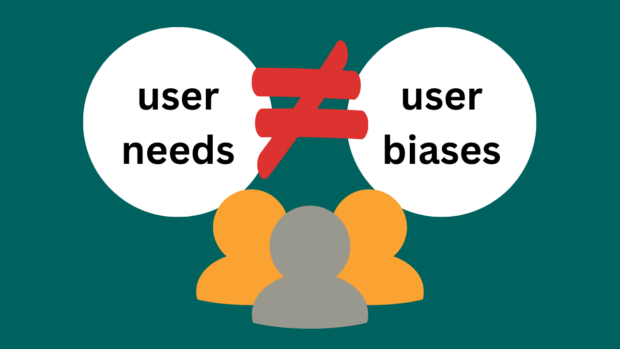User needs and user biases: telling them apart

As I sat through my 10th or so user research interview on the Common Tools as a Service project at the Ministry of Housing, Communities and Local Government (MHCLG), I realised 2 things:
Civil servants are incredibly passionate about their work and are very happy to talk to you about it in as much detail as you are willing to endure. There are a lot of biases in relation to digital tools.In this post, I’m going to discuss those biases, their consequences, and the strategies and techniques we’ve implemented in our user research to counteract them.
Mitigating cognitive biases
In user research phases, digital teams spend quite a lot of time thinking about mitigating cognitive biases. We plan for this in the questions we ask – the number one rule being: never ask the user what they would like as a solution.
During user research interviews for the Common Tools as a Service project, users demonstrated heavy emotional attachment to digital tools. Some people loved one operating system; other people really hated it for various reasons and negative experiences. Some people were attached to specific tools because they had used them in their previous workplaces, and there were other software products they also wanted to try.
This emotional connection to tools can often cloud the true needs of the user and the department.
Our approach to user research interviews
What we found was:
Instead of asking people about solutions, it is much better to ask people about the outcomes they are trying to achieve, and map the current processes they’re following to get there, to understand their needs. Verifying process maps you create with the individual user and their teams helps you understand the interconnection between a user need and an organisational one. Users often have solutions in mind and relay this agenda in their answers. This cognitive bias can be mitigated by looking at the common use cases across different groups of users when synthesising your user research.The hidden inefficiencies
As we investigated further into our research, we uncovered additional layers of complexity in understanding user needs – the hidden inefficiencies. Often, users have adapted to inefficient processes without realising it. Part of our job is to uncover these hidden inefficiencies that users may not even be aware of.
Our new research strategies
To address the challenges I discussed above, we implemented several strategies:
Observational research: Instead of relying solely on interviews, we incorporated observational sessions where we watched users interact with a tool we had built, in their natural work environment. Future-state scenarios: We presented users with hypothetical future-state scenarios, asking them to imagine how they would accomplish their tasks in these situations. This approach helped bypass immediate biases and encouraged more open-minded thinking. Data-driven insights: We complemented our qualitative research with quantitative data on tool usage, task completion times, and user satisfaction. This provided a more objective view of user needs and pain points.Navigating user needs versus user biases
In the end, navigating user needs versus user biases is a delicate balancing act. It requires a combination of empathy, critical thinking and methodical research techniques. By focusing on outputs and processes rather than specific tools or solutions, we can cut through biases and uncover the true needs of both users and the organisation.
When you subscribe to the blog, we will send you an e-mail when there are new updates on the site so you wouldn't miss them.

Comments